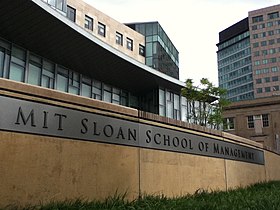The MIT Sloan School of Management (also known as MIT Sloan or Sloan) is the business school of the Massachusetts Institute of Technology, in Cambridge, Massachusetts, USA.
MIT Sloan offers bachelor's, master's, and doctoral programs, as well as non-degree executive education, and has over 20,000 alumni globally. Its largest program is its full-time MBA, which is one of the most selective in the world, with students from more than 60 countries every year, and ranked #1 in more subjects than any other MBA program.
MIT Sloan places great emphasis on innovation and invention, and many of the world's most famous management and finance theoriesâ€"including the Blackâ€"Scholes model, the binomial options pricing model, the Modiglianiâ€"Miller theorem, the neoclassical growth model, the random walk hypothesis, Theory X and Theory Y, and the field of System Dynamicsâ€"were developed at the school. Several Nobel laureates in economics and John Bates Clark Medal winners have been on the faculty.
MIT Sloan Management Review, a leading academic journal focused on the management of innovation, has been published by the school since 1959. Since 2006, the MIT Sloan Sports Analytics Conference has attracted representatives from the MLB, NBA, NFL, NHL, MLS, and Premier League.
History

The MIT Sloan School of Management began in 1914, as the engineering administration curriculum (or "Course 15" in the MIT parlance) in the MIT Department of Economics and Statistics. The scope and depth of this educational focus have grown steadily in response to advances in the theory and practice of management to today's broad-based management school. A program offering a master's degree in management was established in 1925. The world's first university-based executive education programâ€"the Sloan Fellows programâ€"was created in 1931 under the sponsorship of Alfred P. Sloan, himself an 1895 MIT graduate, who was chairman of General Motors and has since been credited with creating the modern corporation. An Alfred P. Sloan Foundation grant established the MIT School of Industrial Management in 1952 with the charge of educating the "ideal manager", and the school was renamed in Sloan's honor as the Alfred P. Sloan School of Management.
In the 1960s, the school played a leading role in founding the first Indian Institute of Management. In 1990, the MIT Entrepreneurship Center was founded at MIT Sloan, one of the few business school entrepreneurship centers in the world focused on high tech. It sponsors both the MIT $100K Entrepreneurship Competition as well as the popular and unique Entrepreneurship Lab and Global Entrepreneurship Lab courses, which sponsor MBA students to work on-site with start-ups throughout the world. The school has grown to the point where management has become the second largest undergraduate major at MIT, and in 2005, an undergraduate minor in management was opened to 100 students each year. The Sloan Business Club is the official undergraduate business club for all MIT students.
MIT Sloan has numerous initiatives to establish business practices that strengthen local economies and positively shape the future of global business. These include initiatives aimed at giving people and organizations the knowledge to conduct business productively in every corner of the world. Examples of MIT Sloan's primary initiatives in this arena are the MIT-China Management Education Project, the International Faculty Fellows Program, and partnerships with IMD, IESE, Tsinghua University, the Sungkyunkwan University Graduate School of Business, the New University of Lisbon, and the Skolkovo Moscow School of Management. In addition to these programs, the school is engaged in other educational and research initiatives on five continents.
Academics

The curriculum is focused on action learning, which requires that students apply concepts learned in the classroom to real-world business settings. Courses are taught using both the case method as well as through lectures and team projects. The academic level of coursework is considered extremely rigorous by business school standards, with a greater emphasis on analytical reasoning and quantitative analysis than most top programs. Courses are offered in accounting, economics, entrepreneurship, finance, industrial relations, information technology, leadership, marketing, operations management, organizational behavior, statistics, strategic management, supply chain management, and many other fields.
Academic rigor has a strong influence on the school's culture. The first semester, also known as the core, is often considered the most difficult semester by design. Students are required to take the following courses: Economic Analysis for Business Decisions, Financial Accounting, DMD (Data, Models and Decisions), Organizational Processes, and Communication for Managers. In addition, they may choose to take one of the following electives: Finance Theory, Intro to Operations, Introduction to Marketing or Strategy.
Courses are graded using letter grades and on the same five-point scale used throughout MIT. In its graduate programs, anything less than a 4.0 ("B") average will not allow the student to graduate. Unlike most other leading business schools, MIT Sloan is consistent with MIT and does not offer any academic honors at graduation. The philosophy behind this is that the honor is in being an MIT graduate.
MIT Sloan closely collaborates with MIT's engineering, science, and economics programs. MIT and Harvard University also collaborate, and students at each institution frequently pursue simultaneous graduate degrees at the other. In addition, MIT Sloan students can freely cross-register for courses at Harvard Business School, and vice versa, the only pair of leading business schools to have such an agreement. Some joint degree programs have been formalized between MIT Sloan and Harvard, including a joint MBA/MPP program with the Harvard Kennedy School. In addition to programs aimed at practitioners MIT Sloan also offers a world-class PhD program that trains future researchers in the areas of finance, operations research, economic sociology, organization behavior, marketing, system dynamics, accounting, IT and technological innovation and entrepreneurship.
Student life

The MIT Sloan culture is similar to, but also distinct from, overall MIT culture, and is influenced most strongly by its MBA program. MIT Sloan graduates may choose to wear the famous MIT class ring, known as the Brass Rat or the "Grad Rat", which is the Brass Rat for graduate students. MIT Sloan students and alumni informally call themselves Sloanies.
A staple of MIT Sloan life is the weekly C-Function, which stands alternately for "cultural function" or "consumption function". The school sponsors food and drink for all members of the MIT Sloan graduate community to enjoy entertainment organized by specific campus cultural groups or clubs as well as parties with non-cultural themes. These functions are held on most Thursdays, often in the Walker Memorial building near the school. MIT Sloan alumni groups around the world also organize C-Functions for their club members, for social and networking activities.
As of November 2013, students at MIT Sloan have organized about 25 business and professional clubs, 30 cultural or personal affiliation clubs and 8 sports and recreation clubs. Although membership varies from year to year, one of the largest clubs on campus is the Sloan Women in Management (SWIM). Other popular clubs include Finance, Management Consulting Club (MCC), Entertainment, Media and Sports (EMS), MIT Energy @ Sloan, MIT Quantitative Finance Club (QFC), Venture Capital and Private Equity (VC/PE), the MIT Product Management Club, and the MIT Sloan Technology Club. Most of the large clubs on campus organize student conferences and other programming throughout the year (e.g., speakers, community service events, mixers).
Programs

General degree programs
- MBA program
- Ph.D. program
- Undergraduate program
Specialized degree programs
- Leaders for Global Operations program, formerly known as Leaders for Manufacturing
- Master of Finance program
- Master of Science in Management Studies program
- System Design and Management program
Executive programs
- Sloan Fellows program
- Executive MBA program
- Advanced Certificate for Executives in Management, Innovation, and Technology
- Executive Certificate in Technology, Operations, and Value Chain Management
- Executive Certificate in Management and Leadership
- Executive Certificate in Strategy and Innovation
- Advanced Management Program
Research centers
- MIT Entrepreneurship Center
- MIT Center for Digital Business
- MIT Center for Collective Intelligence
- MIT Center for Information Systems Research
- MIT Laboratory for Information and Decision Systems
- MIT Center for Biomedical Innovation
- MIT Center for Computational Research & Management Science
- MIT Center for Energy & Environmental Policy Research
- MIT Laboratory for Financial Engineering
- MIT Leadership Center
- MIT Operations Research Center
- MIT System Dynamics in Education Project
Faculty

Deans
- Erwin Schell, 1930â€"1951 (Department of Business and Engineering)
- Edward Pennell Brooks, 1951â€"1959
- Howard W. Johnson, 1959â€"1966
- William F. Pounds, 1966â€"1980
- Abraham Siegel, 1980â€"1987
- Lester Thurow, 1987â€"1993
- Glen L. Urban, 1993â€"1998
- Richard L. Schmalensee, 1998â€"2007
- David Schmittlein, 2007â€"present
Notable current and former faculty
Notable alumni

References
External links

- Official website
- MIT Sloan School of Management Course Materials on MIT OpenCourseWare


Post a Comment